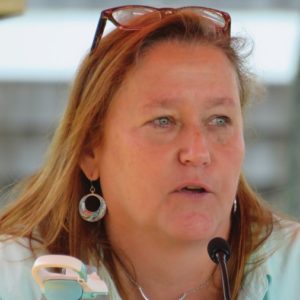WELLFLEET — With a show of hands, voters at Saturday’s special town meeting agreed to buy Maurice’s Campground for the purpose of siting affordable, year-round, and seasonal housing on its 21.25 acres. The negotiated purchase price is $6.5 million.

“I know you are all aware of the need for housing,” Elaine McIlroy, the housing authority chair and a Maurice’s Campground Working Group member, told the 295 voters (9.6 percent of those registered in Wellfleet) who attended the meeting on the elementary school ballfield. “But I cannot emphasize enough how our community is being hollowed out with the outflow of young people over the past two decades, the lack of workers who keep things running and our economy thriving, the loss of year-round homes to seasonal homes and short-term rentals, the impossibility of finding a secure year-round rental, and the staggering cost of buying a home today.”
The campground acreage, between Route 6 and the bike trail, is currently dotted with 240-odd campsites, one single-family house, four cottages, seven cabins, a general store, an office building, and other outbuildings, said Sharon Rule-Agger, a working group member.
After about one hour of questions and mostly supportive arguments, voters showed that they were on board despite last-minute changes regarding oversight of 35 cesspools on the property — and the added complexity that the seller stipulated the town must run the campground as is for six years before turning it over to a developer.
“Many of you have asked why we need to keep the campground in operation for six years,” Rule-Agger said. “The simple answer is it provides seasonal housing for 60 to 80 local workers. All the studies have shown that it is a feasible plan. We can afford it. It is a fair price. It will cost the average homeowner less than $60 a year. The cost of building housing and septic will be borne by the developer. The town will not be running the campground. It has been determined that the best alternative is to lease it to an outside operator. Under this scenario, the town will not have the liability and will also receive some income.”
A last-minute wrinkle in the deal emerged four days before town meeting. That was when local officials contacted the state Dept. of Environmental Protection (DEP) and learned that, contrary to what they had understood during weeks of planning, the local board of health does not have the authority to grant a waiver to state septic regulations requiring that cesspools be upgraded when a property is sold.
That is because Maurice’s daily wastewater flow exceeds 10,000 gallons, which triggers DEP oversight. Maurice’s owners, three brothers from the Gauthier family, have continued to maintain the cesspools, which are considered failed systems under DEP rules, since 2005.
This matters in relation to the short-term goal of keeping the campground open, but not so much for the overall purpose of building housing. If the DEP now finds that the cesspools are unacceptable, the town will have to close the campground. Was that OK with the Gauthiers? Andrew Freeman asked. Town Administrator Rich Waldo said the Gauthier family agreed to amend the purchase and sale to reflect that possibility: the town can shut down the campground if and when town officials determine the septic requirements have become too costly.

Voters wanted to know how many of the future homes would be rented or sold to “locals.”
McIlroy said that 70 percent of the units awarded in the first housing lottery can go to Wellfleet residents — defined as those who live or work in Wellfleet or send their children to the local schools.
“We also have to recognize that we have lost so many people, we need to welcome other members of our community,” she said. Outer Cape Health Services does not have enough nurses, she added, and new ones would need to move here from other places.
She said that all six apartments at the last completed Wellfleet affordable housing project, on Gull Pond Road, went to locals. Seven of the eight homeowners who received buy-down grants for Wellfleet homes were local. The eighth was from Harwich.
Fred Bell Way, a 12-unit housing development built 18 years ago, was limited to those earning 30 percent or less of area median income. McIlroy said she was not sure how many units went to people from elsewhere originally, but gradually waitlists for housing include fewer people from other places and more locals.
Other voters wanted assurances that the whole property would be used for affordable and workforce housing.
Because the planning for a development is six years away, there are no guarantees, said Harry Terkanian, another working group member. His colleague Gary Sorkin said the intention is for all of it to be used for housing, though a master plan for the property must be made.
In Article 7, voters agreed to designate $645,000 in Community Preservation Act (CPA) funds to buy three acres of the Maurice’s property to be used specifically for a development that can be deed-restricted for future tenants earning 100 percent or less of area median income. That amount will be deducted from the full purchase price, not added to it, Terkanian said. Most affordable housing developers rely on income tax credits granted to projects reserved for lower-income tenants. Using CPA funds allows for a different income mix, Sorkin explained.
Dissent came from the town’s finance committee, which voted 3-2 not to recommend the purchase. The committee, which has nine members, did not explain why four members did not vote. Chair Kathleen Granlund said she and two others voted against the purchase because “we were concerned with the unknowns and the cost of those unknowns between transitioning from the purchase to what needs to be done.”
Susan Reverby, president of the Wellfleet Seasonal Residents’ Association, expressed support.
“All of us have a stake in making sure that we have a town that can have a diverse community that makes Wellfleet viable for all of us,” said Reverby. “This principle should be a guidepost now and into the future.”
Terkanian summed up the working group’s message before the vote.
“Let’s not let the perfect become the enemy of the good,” he said. “We understand it will take hard work and determination. This is a question that really is determinative of the soul of Wellfleet.”
Voters must also approve the purchase as a debt exclusion at a town election on Sept. 20.



